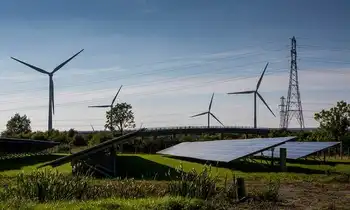Ontario approves 40 clean energy projects
ONTARIO - The province of Ontario, fast becoming a clean energy powerhouse, said it has approved 40 new large-scale renewable power projects that will create 7,000 jobs and attract $3 billion in private sector investment.
This second round of projects will generate 872 megawatts of electricity from the sun, wind and water, enough power for more than 200,000 homes. It follows the April announcement of 180 projects that will generate 2,400 MW of clean energy.
The contracts come under Ontario's feed-in tariff FIT program, which pays above-market prices under long-term contracts for power generated by projects that use a set quota of equipment that has been manufactured in the province.
The European-style FIT program was launched by Ontario's Liberal government in October 2009 with the aim of creating jobs, cutting pollution and replacing power lost by the government's plan to shut down all of Ontario's coal-fired generators by the end of 2014.
The province awarded contracts to 35 solar projects, generating a total of 257 MW of power, four wind projects, for a combined 615 MW, and one 500-kilowatt hydroelectric project. At least 240 wind turbines and one million solar panels will be used in the developments, the province said.
SkyPower Ltd, Canada's largest solar developer, said it was awarded 13 solar contracts totaling 148.3 MW of energy capacity.
Nigig Power Corp has the largest contract, for a 300 MW wind project planned for Pickerel, in northern Ontario, followed by a 230 MW wind project proposed by Renewable Energy Business Ltd for Smithville, on the Niagara Peninsula.
Developers submitted 325 proposals for projects greater than 500 kilowatts, with a total generating capacity of 4,547 MW.
The heavy load of applications delayed testing for power transmission and distribution availability, used to help determine contract awards, the province said.
Projects that were not approved because they lack transmission capacity are now studied to determine if grid expansion costs are justified.
"We're expecting that more projects will be approved in the spring once those economic connection tests are complete," Ontario Energy Minister Brad Duguid said in an interview.
The province said it expects to award Phase 3 contracts for capacity allocation-exempt projects under 500 kilowatts in the coming weeks.
Earlier this month, the province put a moratorium on offshore wind projects, saying it needed more scientific data on their impact. The decision angered clean power developers and advocates.
A looming provincial election has also created uncertainty in Ontario's clean energy industry because the opposition Progressive Conservative Party has promised to scrap "ridiculously" generous rates for green power developers if they win the October 6 vote.
Tariff rates are reviewed every two years under the FIT program, with the first review set to conclude this autumn.
"As the world is building out more and more renewable energy projects the cost of building projects has been going down and that, frankly, needs to be reflected in the feed in tariffs as well," Duguid said.
Under the FIT program, about $1 billion worth of solar and wind projects have started up or are in the process of being built in Ontario, according to government data. About 13,000 jobs have been created in Ontario due to green energy legislation, the government estimates.
A string of companies has announced plans to set up operations in Ontario in the 16 months since the FIT program was introduced. Most notably, South Korea's Samsung C&T has committed $7 billion to build four wind and solar clusters and four manufacturing sites in the province.
Related News

Alberta creates fund to help communities hit by coal phase-out
EDMONTON - The Coal Community Transition Fund is open to municipalities and First Nations affected as Alberta phases out coal-fired electricity by 2030 to focus on renewables and natural gas.
Economic Development Minister Deron Bilous says the government wants to ensure these communities thrive through the transition
“Residents in our communities have concerns about the transition away from coal,” Rod Shaigec, mayor of Parkland County, said.
“They also have ideas on how we can mitigate the impacts on workers and diversify our economy to create new employment opportunities for affected workers. We are working to address those concerns and support their ideas. This…



